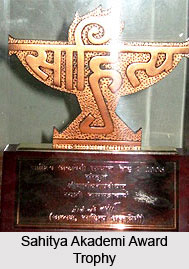 Sahitya Akademi Award is given away every year, beginning from 1954, by Sahitya Akademi (India`s National Academy of Letters), to writers and their works, for their spectacular and irreplaceable contribution to the upliftment of Indian literature. Assamese literature in particular, was also never left behind in such an esteemed and venerated a sphere.
Sahitya Akademi Award is given away every year, beginning from 1954, by Sahitya Akademi (India`s National Academy of Letters), to writers and their works, for their spectacular and irreplaceable contribution to the upliftment of Indian literature. Assamese literature in particular, was also never left behind in such an esteemed and venerated a sphere.
As can be seen successively:
| Year | Book | Author |
| 2009 | Daini (Novel) And Katha Ratnakar (Novel) | Late Monoranjan Lahary and Dr Dhrubajyoti Bora |
| 2008 | Deo Langkhui (Novel) | Reeta Choudhury |
| 2007 | Santanu KulNandan (Novel) | Purabi Bormudoi |
| 2006 | Cheneh Jarir Gathi (Short stories) | Atulananda Goswami |
| 2005 | Mouna Uth Mukhar Hridoy (Novel) | Yese Dorje Thongse |
| 2004 | Manuh Anukule (Poetry) | Hirendra Nath Dutta |
| 2003 | Anek Manuh Anek Thai Aru Nirjonota (Poetry) | Bireshwar Barua |
| 2002 | Mahat Aitihya (Prose) | Nalinidhar Bhattacharya |
| 2001 | Adhani Mahir Hahi (Novel) | Mahim Bora |
| 2000 | Baghe Tapur Rati (Short stories) | Apurba Sharma |
| 1999 | Bippana Somoy (Novel) | Medini Choudhury |
| 1998 | Ashirbador Rong (Novel) | Arun Sharma |
| 1997 | Andharot Nijor Mukh (Short stories) | Nagen Saikia |
| 1996 | Abhijatri (Novel) | Nirupama Borgohain |
| 1995 | Maharathi (Novel) | Chandra Prasad Saikia |
| 1994 | Madhupur Bahudur (Short stories) | Sheelabhadra |
| 1993 | Muru Je Kiman Hepah (Lyrics) | Keshav Mahanta |
| 1992 | Saisor Pothar Manuh (Poetry) | Hiren Bhattacharya |
| 1991 | Brahmaputra Ityadi Padya (Poetry) | Ajit Barua |
| 1990 | Sneha Devir Akuki Galpa | Sneha Devi |
| 1989 | Assamiya Jatiyo Jeebonot Mahapurukhia Parampora (Criticism) | Hiren Goh ain |
| 1988 | Patal Bhairobhi (Novel) | Laksminandan Bora |
| 1987 | Aan Ejon (Poetry) | Harekrishna Deka |
| 1986 | Benudhar Sharma (Biography) | Tirthanath Sarma |
| 1985 | Krishnakanta Handique Rasana Sambhar (Prose) | Krishnakata Handique |
| 1984 | Jangham (Novel) | Debendra Nath Acharya |
| 1983 | Sudhirga Din Aru Rati (Poetry) | Nirmal Probha Bordoloi |
| 1982 | Mamore Dhara Tarual (Novel) | Mamoni Roysom Goswami (Indira Goswami) |
| 1981 | Kabita (Poetry) | Neelamoni Phukan |
| 1980 | Prithibir Akukh (Short stories) | Jogesh Das |
| 1979 | Sunali Jahaj (Poetry) | Bhaben Barua |
| 1978 | Pita Putra (Novel) | Homen Borgohain |
| 1977 | Bakul Banar Kabita(Poetry) | Anandra Chandra Barua |
| 1976 | Srinkhal (Short stories) | Bhabendra Nath Saikia |
| 1975 | Kakadeutar Har (Novel) | Nabakanta Barua |
| 1974 | Golam (Short stories) | Saurav Kumar Chaliha |
| 1972 | Aghari Atmar Kahini (Novel) | Syed Abdul Malik |
| 1970 | Mahatmar Pora Rupkuoroloi (Reminiscences) | Lakshminath Phukan |
| 1969 | Manchalekha (Prose) | Atul Chandra Hazarika |
| 1968 | Alakanda (Poetry) | NaliniBala Devi |
| 1967 | Adhunik Galpa SahityaLiterary criticism | Trailokya Nath Goswami |
| 1966 | Bedanar Ulka (Poetry) | Ambikagiri Roychudhury |
| 1964 | Assamar Looka Sanskriti (Prose) | Birinchi Kumar Barua |
| 1961 | Iaruingom (Novel) | Birendra Kumar Bhattacharya |
| 1960 | Congressor Kasiyoli Rodot (Reminiscences) | Benudhar Sharma |
| 1955 | Banaphul (Poetry) | Jatindra Nath Duowrah |






